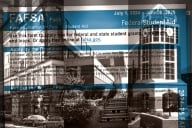You have /5 articles left.
Sign up for a free account or log in.
WASHINGTON -- The Veterans Affairs Department is planning to resume a policy of cutting into the tuition payments from the Post-9/11 GI Bill for veterans with outstanding debts, drawing protests from higher education associations who say that the policy will force colleges to become debt collectors themselves.
Veterans who owe debt to the department -- including advance payments under the Post-9/11 GI Bill that require repayment, as well as debt incurred from other Veterans Affairs benefit programs for housing and medical expenses -- can have future aid withheld to repay the money they owe.
But tuition benefits have been exempt from such withholding since shortly after distribution of educational benefits began under the Post-9/11 GI Bill. In December, the department quietly indicated its intention to resume withholding unpaid debts from veterans’ tuition and fee payments.
On Monday, in a strongly worded letter to Veterans Affairs Secretary Eric Shinseki, higher education associations warned that the new policy could have “unintended consequences” and “violates the faith and intent of the enrollment certification process,” in which a veteran enrolls in college under the assumption that the Post-9/11 GI Bill will cover the costs.
“We fully recognize the fiduciary responsibility VA must uphold in collecting any non-tax debts owed to the federal government by the recipients of VA benefits,” John Walda, president and CEO of the National Association of College and University Business Officers, wrote in a letter also signed by the major associations representing public and nonprofit higher education. “However, the proposed policy exposes veterans to even greater debt liabilities and unduly stresses the partnership between the federal government and colleges and universities in their mutual goal to provide educational opportunity to our nation’s veterans.”
Colleges allow students paying for college with the GI Bill to enroll in and begin attending classes before benefits arrive. If those payments are docked to cover past debts, the college can be left without enough money to cover the cost of attendance, said Anne Gross, NACUBO’s vice president for regulatory affairs.
In effect, the colleges become debt collectors themselves: while the department has been repaid, the veteran now owes the same amount to the college or university he or she attends. Many veterans don’t understand why they didn’t receive the full cost of tuition and fees in benefits, and the result is frequently confusion, Gross said.
“Instead of owing the VA, they now owe the school, but the school didn’t know this ahead of time,” she said.
Veterans who owe back tuition to institutions usually can’t register for another term, meaning that the practice puts their future educational success in jeopardy, the associations wrote.
Docking benefit payments for debt collection is standard practice for the VA. But because before the Post-9/11 GI Bill payments for educational benefits were made directly to the veterans, not to colleges, the practice hadn’t been an issue in the past, Gross said. Educational benefits were made exempt amid the initial difficulties in processing benefits in 2009, when the bill first took effect.
Adding to the problem, the associations say, is that colleges and universities have no way of knowing if veterans have outstanding debts to the VA -- and thus won’t get a payment to cover all tuition and fees -- until the benefit checks arrive, so the financial aid office can’t advise them to take out loans or seek other financial aid to cover the remaining costs.
In addition to asking the department to continue exempting educational benefits from debt collections, the college associations have requested a system in which college officials can check on veterans’ benefit eligibility, overpayment amounts and other factors that can affect the amount of aid they receive.
Under the plans to resume withholding debts from tuition benefits, colleges would not be notified that payments are being withheld, the associations wrote, warning that the approach will lead to “a flurry of inquiries” among colleges, students and the department.
“When offsets against tuition payments were allowed,” they warned, “confusion reigned.”







